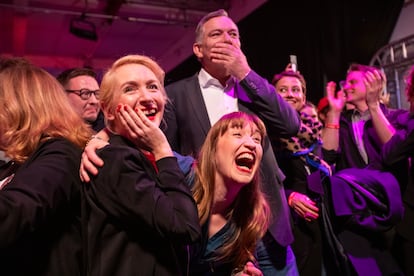Youth vote and housing-focused campaign boost Left's comeback in Germany


A year ago, no one could have predicted that the Left Party (Die Linke) would be able to recover after losing its status as a parliamentary group when its former icon, Sahra Wagenknecht , left to form another party with several MPs. In mid-January, polls predicted that the post-communist party would be eliminated from the German parliament after this blow. But a campaign focused on rent caps, the fight against rising living costs and the defence of social measures, together with successful use of the networks, catapulted the Left to 8.7% in last Sunday's elections. In addition, it obtained six direct mandates, which is the second best result in the history of the party in direct votes - Germans vote for a list and a constituency candidate.
As if that were not enough, the surprise also came in Berlin, where it became the most voted force with 19.9%, almost double that of 2021. The German capital is closely linked to well-known politicians of the Left, such as Gregor Gysi, who has achieved first place in the direct vote for candidates in the Treptow-Köpenick electoral district in several elections.
But what has led to the recovery and success of a party that seemed forgotten? A politician who was almost unknown six months ago has a lot to do with it: Heidi Reichinnek, 36 years old and co-chair of the electoral list with Jan van Aken .
A video of her speech in parliament at the end of January against the conservative immigration proposal supported by the ultra-right Alternative for Germany (AfD) was viewed more than 30 million times on the internet. “With this speech she made herself known and reached many people and voters who are considered to be more progressive. It was very well received,” says political scientist Antonios Souris from the Free University of Berlin (FU) over the phone. “A clear message, embodied by a likeable politician, which was then also transmitted through the media and social networks.”
The leader is considered a prominent face of the feminist left and has had a meteoric rise in the party. She has gone from being the youngest member of the parliamentary group to being a candidate for the chancellery. Reichinnek has 580,000 followers on TikTok and 500,000 on Instagram. Her videos receive millions of likes , which puts her in the shade of other highly successful figures on social media such as AfD leader Alice Weidel.
Diesen Tag werden wir nie vergessen! Wir versprechen euch, dass wir alles dafür tun, eurem Vertrauen gerecht zu werden. Danke! Ohne euch wäre das nicht möglich gewesen! ❤️ pic.twitter.com/UJFdW6tGQk
— Die Linke (@dieLinke) February 23, 2025
With memes and short videos, the party explained its programme, rapped election slogans and performed at raves . It won over young voters in this way. It received 27% support among first-time voters – ahead of the 20% obtained by the AfD – and 25% among voters aged 18 to 24. “We did very well on social media. We broke the AfD wave. We won the youth over for us,” Reichinnek said at a press conference on Monday.
A social policy and a close relationship with citizens are also part of their success. The Left turned a large-scale home survey into a door-to-door election campaign. In the end, they declared that they had called more than 600,000 homes. The issues that were noted as concerns during their visits became their main points in their programme: excessive rents and the high cost of food and heating.
Three experienced politicians also contributed to the party's electoral success: Gregor Gysi, Dietmar Bartsch and Bodo Ramelow proclaimed the so-called "Mission: Silver Locks" in the autumn. Their aim was to secure three direct mandates so that the Left Party could enter parliament, even if it did not pass the 5% threshold required.
This initiative excited traditional voters in the east of the country, where the Left emerged as the heir to the Party of Democratic Socialism (PDS), successor to the Socialist Unity Party of Germany (SED) , which governed eastern Germany.
“This personalization, combined with a very clear message that has drawn a clear line, especially with regard to immigration policy, has been key,” says Souris.
The party, which is in favour of disarmament and is against increasing defence spending, thus gained votes among its traditional electorate, but also in progressive urban sectors that also vote for the Greens, explains the political scientist.
EL PAÍS






